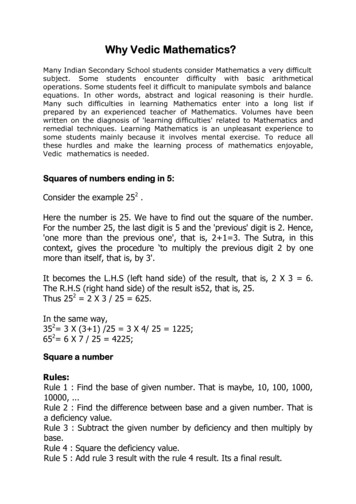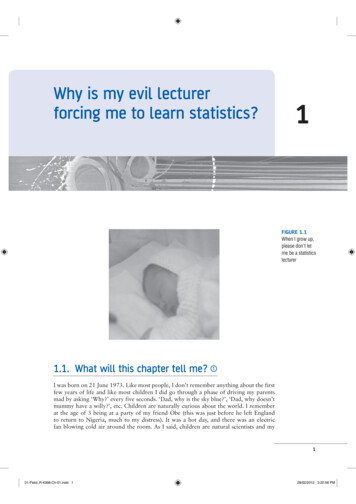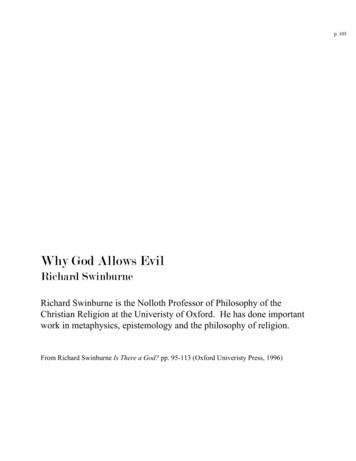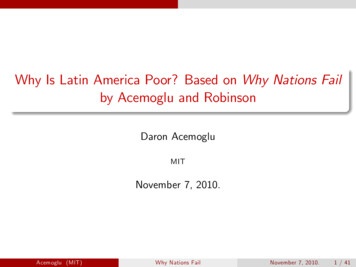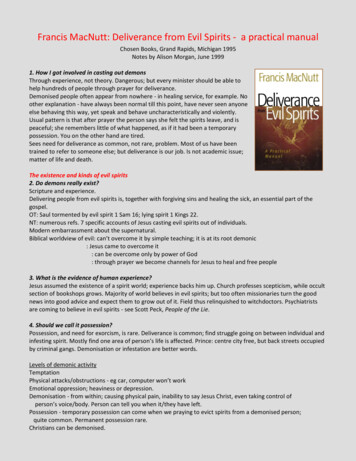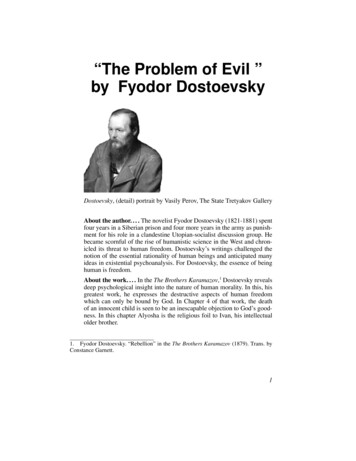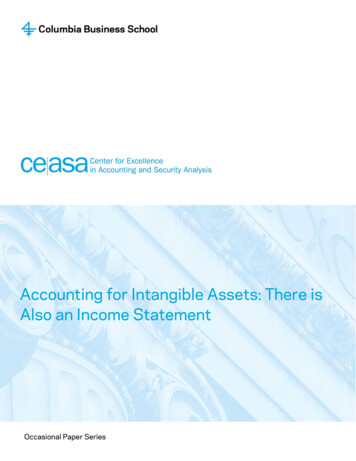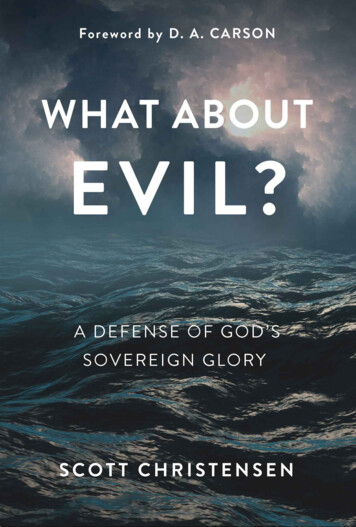
Transcription
“Why is there evil in the world? Scott Christensen shows that this difficultquestion is bound up with two larger questions: ‘Why did God make theworld?’ and ‘Why did God the Son become a man and suffer evil?’ Scripture gives the ultimate answer: to manifest the glory of God. Christensen’sarticulate, inspiring, and gospel-driven presentation of the ‘greater-glory’theodicy explores a significant way that God’s Word addresses the problemof evil to strengthen our faith and evoke our worship.”—Joel R. Beeke, President, Puritan Reformed Theological Seminary,Grand Rapids, Michigan“The problem of evil is the most important argument against the existenceof God. It is said to be all the more difficult to answer when one adopts aReformed/Calvinist view of human free will and divine providence, according to which God, in his sovereign decree, determines everything that comesto pass. Scott Christensen accepts the challenge and offers a Reformed tourde force in response to the multifaceted problem of evil. He argues that evilis not merely, as the French say, a pétard mouillé (a ‘wet petard/firecracker’);rather, it is one that does explode, but backfires into glorifying God, inthe biblical-theological grand narrative of creation, fall, and redemption.Christensen offers a response that is truly Reformed, not just because ofhis Calvinist view of free will (though it certainly has that), but because ofits focus on the glory of God, the centrality of the person of Jesus, and thegood news of redemption in Christ.”—Guillaume Bignon, author, Excusing Sinners and Blaming God;executive committee member, Association Axiome, a society ofFrench-speaking Christian scholars“This is the most Bible-saturated, ‘logic-sensical,’ and God-honoring answerto the so-called problem of evil in our generation. Gifted writer and thinkerScott Christensen has produced in What about Evil? an invaluable resourcefor both the inquisitive believer and the inquiring skeptic alike. I heartilyrecommend it to everyone wrestling with the reality of a good and sovereignGod and the fact that evil still remains in this world.”—Grant R. Castleberry, Executive Director, Council on BiblicalManhood and Womanhood“Scott Christensen’s book What about Evil? deals with the ‘problem ofevil’—how can evil exist in a world created and ruled by a God who issovereign and completely good? Many authors (including me) have takenPR WHAT ABOUT EVIL INT updated.indd 19/22/20 2:40 PM
up this challenge, but it remains a powerful objection to the truth of theChristian faith. Christensen gets beyond the more traditional approachesto the problem, by reminding us that God’s wisdom pervades everything heordains so that the very existence of evil serves his purpose of maximizinggoodness and glorifying himself. Of course, Romans 8:28 and other versessay that this is true. But Christensen shows us how it is true, how even in thisfallen world we can begin to grasp something of God’s light in the midst ofthe darkness, indeed especially there. I commend this book to readers whoseek a serious and thoughtful treatment of this issue.”—John M. Frame, Professor of Systematic Theology and PhilosophyEmeritus, Reformed Theological Seminary, Orlando“Scott Christensen delivers an unflinching, clear, and honest defense of theReformed position on the problem of evil. The volume excels at integratingbiblical theology with systematics and rightly situates theodicy in the history ofredemption, a story that ultimately brings glory to the triune God. I recommendthis project to students, pastors, and teachers who want to ponder this difficultproblem anew. I suspect that I’ll commend this volume for years to come.”—Benjamin L. Gladd, Associate Professor of New Testament,Reformed Theological Seminary, Jackson“Scott Christensen’s work on theodicy is well crafted and contributes tothis important conversation in a significant and helpful way. Christensen’sassertions are clear, tight, and accessible, reaching the intended audiencewith persuasive clarity. His appeal to the felix culpa argument as found insixteenth- and seventeenth-century Reformed theology is both unusualand helpful as it grounds theodicy in the doctrine of God’s eternal glory inChrist, rather than in a series of explanations or excuses that merely appeal tohuman desire to be satisfied intellectually or emotionally. Christensen’s workis solidly argued and well researched; this book deserves a wide audience.”—Grant Horner, Professor of Renaissance and Reformation Studies,The Master’s University“Christians take the problem of evil more seriously than anyone else. This bookavoids simplistic philosophical solutions. Instead, the author appreciates thatthe historical fact of Christ’s incarnation, life, death, resurrection, and returnprovides the only hope when we just don’t know all the answers.”—Michael S. Horton, J. Gresham Machen Professor of SystematicTheology and Apologetics, Westminster Seminary CaliforniaPR WHAT ABOUT EVIL INT updated.indd 29/22/20 2:40 PM
“This book covers a lot of ground as it discusses the perennial question,‘What about evil?’ Cogent, clear, and convincing, Christensen’s book willrequire some work to refute. There is a delicate balance between awarenessof historical and present-day polemics, which will leave readers satisfied thatthey have a good idea of the issues at stake concerning a Reformed theodicy.”—Mark Jones, Senior Minister, Faith Vancouver Presbyterian Church(PCA), British Columbia, Canada“Scott Christensen has a real gift for answering difficult theological questions plainly, thoroughly, and above all biblically—with colorful, engagingwriting that readers at practically any level can easily comprehend and learnfrom. If you’re troubled by the question of why a good and omnipotentGod would create a universe that includes evil—or if you are a Christianstruggling to explain the problem of evil to someone else—you will greatlybenefit from this book.”—John MacArthur, Pastor-Teacher, Grace Community Church, SunValley, California; Chancellor Emeritus, The Master’s Universityand Seminary“This is a bold venture. After all, every attempt to explain the ‘Why?’ ofsin faces the prima facie difficulty that sin, as defined by St. John (1 John3:4), is without law, and thus irreducible to reason and order. This hasnot, however, deterred the world’s greatest minds from trying, and ScottChristensen belongs to a long and honorable succession. In this volumehe sets forth a ‘greater-glory theodicy’ reminiscent of Augustine’s felixculpa, according to which the fall created a need for redemption, whichin turn created the opportunity for God to show the glory of his redeeming love in the person of his Son. In essence, the answer to the question‘What about evil?’ lies in the history of redemption: the story itself is God’svindication, but what is striking is the way in which this volume relatesthis history to modern theories of the ‘architectonics of storytelling.’ Allgreat stories, Christensen argues, follow this pattern: creation (the good),fall, and redemption. But the pattern’s original lies in the biblical narrative, the unique plot of the transcendent Author himself. Behind the story,however, lies the redemptive acts themselves and, supremely, the hero, JesusChrist the Redeemer. God’s design from all eternity was that in him hewould give the supreme revelation of his glory. Christ’s work, culminatingin a new heaven and a new earth, is God’s happy ending. These remarksdo scant justice to the massive and varied erudition that lies behind thisPR WHAT ABOUT EVIL INT updated.indd 39/22/20 2:40 PM
book. The felix culpa argument has never had a more thorough or a moreaccessible presentation.”—Donald Macleod, Professor of Systematic Theology, EdinburghTheological Seminary“One question that I often get as a pastor is: Why does evil exist? Withoutrealizing it, the churchgoer is asking a theological question pertaining toone of the most challenging doctrines in all of Christianity. Thankfully,my friend Scott Christensen has written what I believe to be the definitivebook on theodicy, What about Evil? I’ve grown to expect from Scott nothingless than cogent thinking, thorough examination, engaging writing, andbiblical orthodoxy, and this book delivers on all fronts. After surveying thelandscape of thinking on theodicy, Scott argues for the solution that givesGod the greatest glory. More than just a sit-down-and-read-through book,What about Evil? is a resource that will aid the pastor, scholar, and maturebeliever. I cannot commend this volume highly enough, and I’m thankfulfor Scott’s tireless labors in writing it.”—Nate Pickowicz, Pastor, Harvest Bible Church, Gilmanton IronWorks, New Hampshire; author, How to Eat Your Bible“What Scott Christensen has accomplished with What about Evil? is trulyexceptional. So many Christians experience an onslaught of questionsfrom unbelievers whenever something of a catastrophic nature seeminglyupends society. The natural response of unbelievers is: ‘Where was God?’Christians need reasonable answers to this question. I am often disappointed when I hear ministers answer it by chalking the evil up to ‘barepermission.’ Permission is neither helpful nor comforting when a sovereign, benevolent God is on the throne. Scott has masterfully demonstratedfrom Scripture how believers can answer the seeming ‘problem of evil’that puzzles believers. I happily commend this work to the thoughtfulstudent of Scripture.”—Peter Sammons, Associate Professor of Theology,The Master’s Seminary“Christensen tackles what is perhaps the most difficult question for Christian theology—the problem of evil. No one can answer every question, asChristensen himself admits. Still, the book is a faithful and learned study onthe whole matter, reflecting careful research and scholarship. Here we finda combination that is quite rare: the book is biblically grounded, theologi-PR WHAT ABOUT EVIL INT updated.indd 49/22/20 2:40 PM
cally perceptive, and philosophically astute. Explaining evil in the contextof the storyline of the Scriptures is particularly helpful.”—Thomas R. Schreiner, James Buchanan Harrison Professorof New Testament Interpretation, The Southern BaptistTheological Seminary“The problem of evil is one of the most difficult questions faced by Christians in the proclamation and defense of the gospel as well as in our dailylives. The question of why God has allowed sin and evil to exist in his goodworld must be answered with biblical and theological fidelity. Unfortunately,many of the answers given to this question by Christians over the yearscontain parts of the truth but often miss the big picture centered in theglory of God and God’s eternal plan of redemption. In this excellent andhelpful book, however, Scott Christensen breaks new ground and offers anantidote to subpar ways of answering the problem of evil by returning toScripture and giving us a robust ‘greater-glory theodicy.’ In doing so, thisbook is faithful to Scripture, is true to Reformed theology, interacts withpast and present discussions on the problem of evil with care and precision,and most of all helps the church make sense of the riddle of sin and evil inGod’s eternal plan to bring glory to himself. If you have wrestled with theissues of theodicy and want the best of theological thinking on them, thisbook is a must-read. It will give you answers to your questions—but morethan this, it will lead you to trust and glory in our triune God in the faceof our Lord Jesus Christ.”—Stephen J. Wellum, Professor of Christian Theology, The SouthernBaptist Theological Seminary; editor, The Southern Baptist Journalof Theology“Scott Christensen’s What about Evil? seeks to reconcile the existence of Godand evil by appealing to ‘the grand storyline of the Bible.’ While acknowledging that he is not an analytic philosopher, Christensen displays greatfacility with what philosophy can bring and has brought to the table on thisquestion, while choosing to focus his considerable exegetical and systematictheological gifts on unpacking for his readers the implications of specificbiblical revelation for this question. The result is a ‘cross-centered theodicyof redemptive glory,’ a ‘greater-glory theodicy’ that, while having affinities with greater-good theodicy and best-of-all-possible-worlds theodicy,is more specifically grounded in biblical narrative, rather than sanctifiedspeculation. Christensen’s interaction with contemporary literature on thisPR WHAT ABOUT EVIL INT updated.indd 59/22/20 2:40 PM
topic is both wide-ranging and charitable, and much profit may be gainedin considering how he lays out his case. Of special note is his anticipationof objections from both secular readers and fellow Christians who mighttake a different point of view. Highly recommended.”—Greg Welty, Professor of Philosophy, Southeastern BaptistTheological Seminary; author, Why Is There Evil in the World?“In his What about Evil? Scott Christensen makes a genuine contributionto the discussion of the problem of evil. His treatment of the question fromthe perspective of the Bible’s own story of God’s glory in human redemption is self-consciously biblical rather than philosophical, as well as beingengaging and conceptually clear at every point. A pleasure to commend!”—Fred G. Zaspel, Pastor, Reformed Baptist Church, Franconia,Pennsylvania; Adjunct Professor of Systematic Theology,The Southern Baptist Theological Seminary; executive editor,Books at a GlancePR WHAT ABOUT EVIL INT updated.indd 69/22/20 2:40 PM
WHAT ABOUTE V I L?PR WHAT ABOUT EVIL INT updated.indd 19/22/20 2:40 PM
PR WHAT ABOUT EVIL INT updated.indd 29/22/20 2:40 PM
WHAT ABOUTE V I L?A D E FE N S E O F G O D ’ SS OV E R E I G N G LO RYSCOT T CHRISTENSENPR WHAT ABOUT EVIL INT updated.indd 39/22/20 2:40 PM
2020 by Scott ChristensenAll rights reserved. No part of this book may be reproduced, stored in a retrieval system, ortransmitted in any form or by any means—electronic, mechanical, photocopy, recording,or otherwise—except for brief quotations for the purpose of review or comment, withoutthe prior permission of the publisher, P&R Publishing Company, P.O. Box 817, Phillipsburg,New Jersey 08865–0817.Unless otherwise indicated, all Scripture quotations are from The ESV Bible (The HolyBible, English Standard Version ), copyright 2001 by Crossway, a publishing ministryof Good News Publishers. Used by permission. All rights reserved.Scripture quotations marked (nasb) are taken from the New American Standard Bible ,copyright 1960, 1962, 1963, 1968, 1971, 1972, 1973, 1975, 1977, 1995 by The LockmanFoundation. Used by permission.Scripture quotations marked (niv) are taken from the Holy Bible, New InternationalVersion , NIV . Copyright 1973, 1978, 1984, 2011 by Biblica, Inc. Used by permissionof Zondervan. All rights reserved worldwide. www.zondervan.com. The “NIV” and “NewInternational Version” are trademarks registered in the United States Patent and TrademarkOffice by Biblica, Inc. Scripture quotations marked (nlt) are taken from the Holy Bible, New Living Translation,copyright 1996. Used by permission of Tyndale House Publishers, Inc., Wheaton, Illinois60189. All rights reserved.Scripture quotations marked (nrsv) are taken from the New Revised Standard VersionBible. Copyright 1989 by the National Council of the Churches of Christ in the UnitedStates of America. Used by permission. All rights reserved.Italics within Scripture quotations indicate emphasis added.Printed in the United States of AmericaLibrary of Congress Cataloging-in-Publication DataNames: Christensen, Scott, 1965- author.Title: What about evil? : a defense of God’s sovereign glory / ScottChristensen.Description: Phillipsburg : P&R Publishing, 2020. Includesbibliographical references and index. Summary: “Christensen’stheological response to the problem of evil examines how sin, evil,corruption, and death not only fit into redemptive history but alsomagnify the glory of a good God”-- Provided by publisher.Identifiers: LCCN 2020022888 ISBN 9781629955353 (cloth) ISBN9781629955360 (epub) ISBN 9781629955377 (mobi)Subjects: LCSH: Theodicy. God (Christianity) Good and n: LCC BT160 .C46 2020 DDC 231/.8--dc23LC record available at https://lccn.loc.gov/2020022888PR WHAT ABOUT EVIL INT updated.indd 49/22/20 2:40 PM
ToEddie Ogier, Joe Rice, and Marty Irons.Friends for a lifetime. Brothers in Christ forever.PR WHAT ABOUT EVIL INT updated.indd 59/22/20 2:40 PM
PR WHAT ABOUT EVIL INT updated.indd 69/22/20 2:40 PM
Foreword by D. A. ixixIntroduction: The Problem of EvilTheodicy and the Crisis of Our Secular AgeProbing the DarknessJustifying the Ways of GodGuarding the Sacred Treasure of Free WillWorking for the Greater GoodThe Transcendent Author of HistoryWalking through the Bible’s Dark ForestThe Challenge of Moral ResponsibilityEverybody Loves a Good EndingThe One True StoryThe Fortunate Fall and God’s Greatest GloryGod’s Redemptive Glory in ScriptureThe Peerless RedeemerThe Suffering RedeemerThe Cosmic RedeemerThe Grace-and-Glory 2Appendix: Sullied by Supralapsarianism?GlossarySelect BibliographyIndex of ScriptureIndex of Subjects and Names461473495513527PR WHAT ABOUT EVIL INT updated.indd 79/22/20 2:40 PM
PR WHAT ABOUT EVIL INT updated.indd 89/22/20 2:40 PM
FOREWORDOccasionally one comes across a writer who manages to deal with big themesin exemplary ways—i.e., a writer who seems to know the tiny alleywaysof the subject, but keeps the reader’s attention focused on the big picture.Such a writer, truly gifted, says something fresh and thought-provokingabout the far horizons, yet without losing sight of the details—and withoutdemeaning those who uphold other, more traditional positions. But aboveall, if that writer is dealing with biblical and theological themes, the treatment of Scripture is fresh and compelling.Such a writer is Scott Christensen, and his “big theme” is the sovereignty of God. We came across him five years ago in his book What aboutFree Will? Reconciling Our Choices with God’s Sovereignty. It is one of theablest defenses I’ve seen of confessional compatibilism—that is, the kindof compatibilism upheld by confessing Christians, as opposed to the kindof compatibilism largely condemned by analytic philosophers. Christianshold that two fundamental truths commonly assumed and even taughtin Scripture are mutually compatible: (1) God is absolutely sovereign, buthis sovereignty never mitigates human responsibility; (2) human beingsare morally responsible before God (they believe and disbelieve, they obeyand disobey, they love and hate, and these and other actions are morallysignificant actions for which they are rightly held responsible), but suchmorally significant behavior does not make God absolutely contingent. Ifyou hold both these statements to be true, you are a compatibilist. In hisearlier book, Christensen sought to show that such biblical compatibilismis worked into the very fabric of the biblical storyline and, rightly understood, anchors how Christians think about suffering, prayer, providence,faith, freedom, what the cross achieved, and more.Integrally related to the theme of divine sovereignty is the theme oftheodicy: if God is both utterly sovereign and immaculately good, howcan he ordain (permit?) evil in this world? Or, alternatively, granted thatthere is so much evil and suffering, perhaps he is not good; or, if he is good,ixPR WHAT ABOUT EVIL INT updated.indd 99/22/20 2:40 PM
x Forewordperhaps he is not sovereign—he’s doing the best he can, poor chap. This isthe set of conundrums that Christensen sets out to address in this book,What about Evil? A Defense of God’s Sovereign Glory.Christensen rightly ins
Sep 22, 2020 · Theological Seminary “The problem of evil is one of the most difficult questions faced by Chris - tians in the proclamation and defense of the gospel as well as in our daily lives. The question of why God has allowed sin and evil to exist in his good world must be answered with biblical
